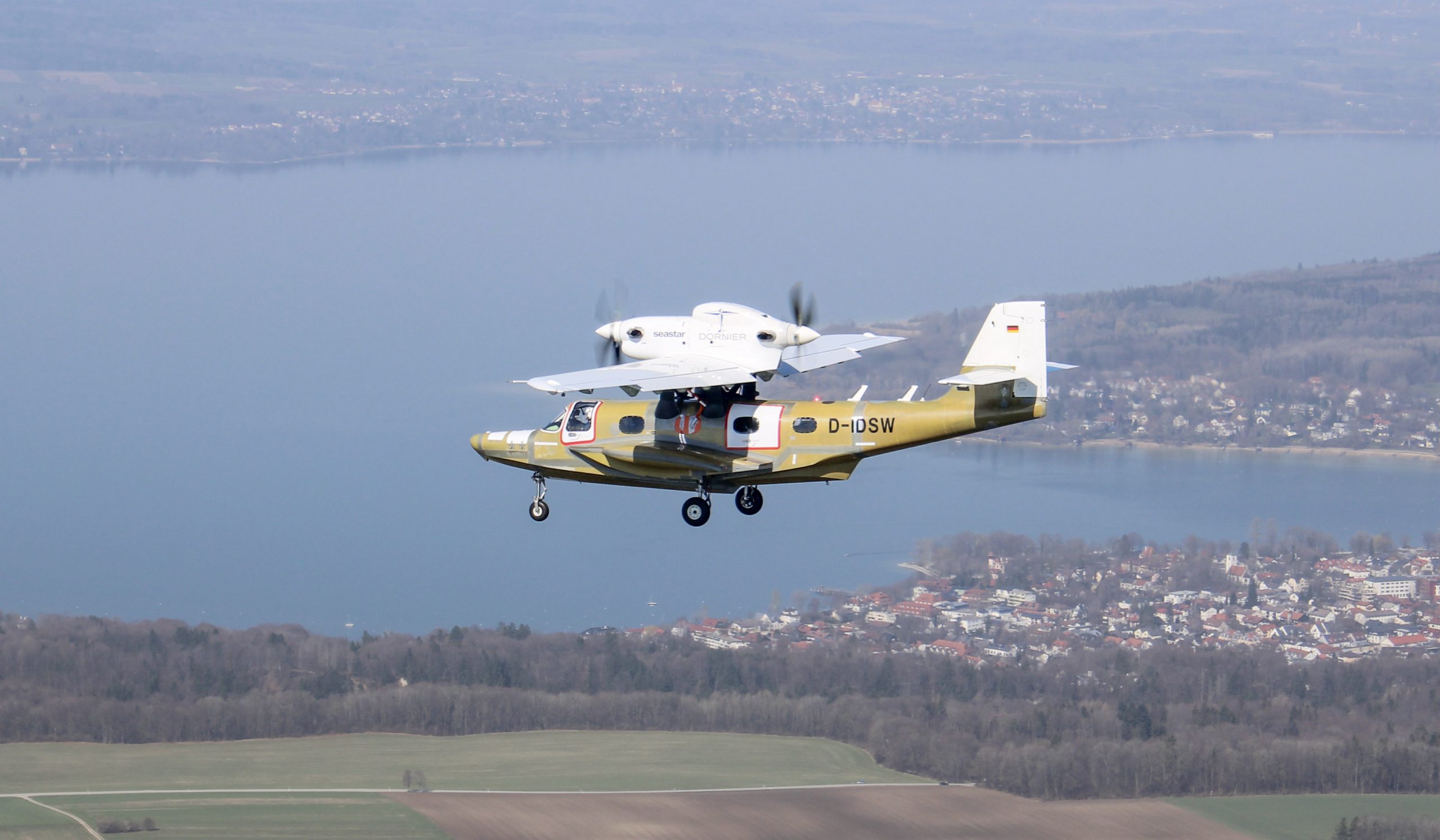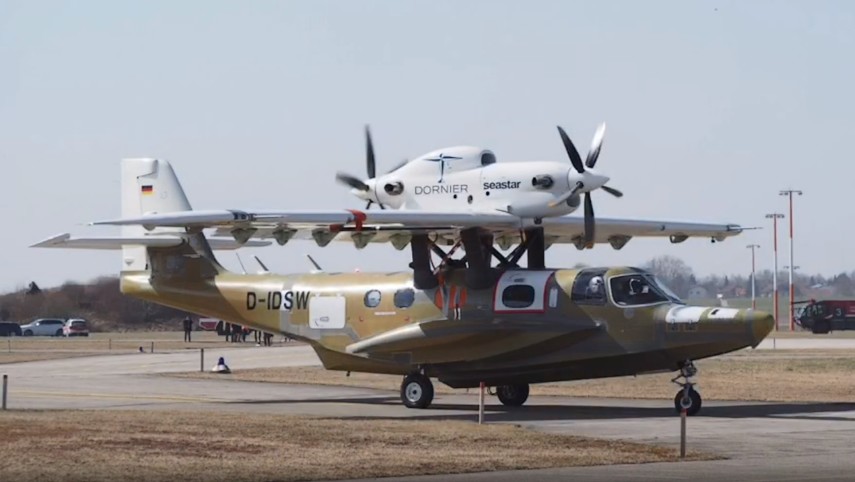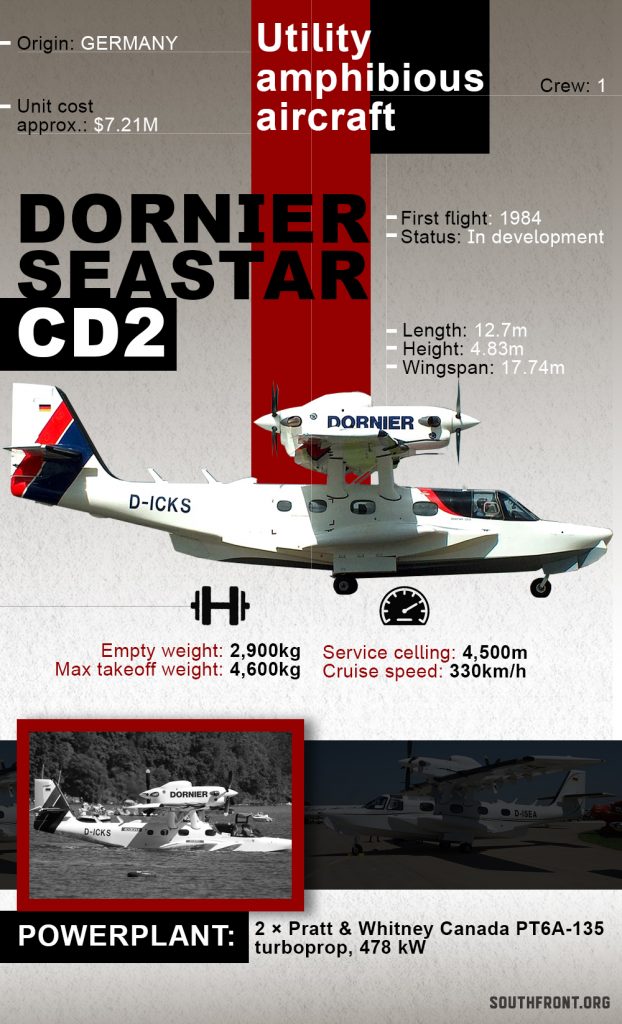On March 28th, a New Generation of the Dornier Seastar amphibious aircraft successfully performed its first flight at Oberpfaffenhofen EDMO airport, Germany.
The flight was performed by Dornier Seawings test pilot crew and took 31 minutes.
The Seastar SN1003 attained the required approvals from EASA and LBA on 19 March 2020, this was a major milestone and achievement for the program.
As per the manufacturer, The New Generation Seastar is significantly improved from the original Seastar which was designed and developed by Claudius Dornier Jr. in the 1980s.
The New Generation is equipped with a state-of-the-art full digital glass cockpit, new highly efficient propellers, several systems including air-conditioning and stern thruster, plus a corrosion-resistant composite structure that results in reduced maintenance keeping costs significantly down particularly in sea water operations.
Its operation concept is to enhance short to medium haul trips by making them cheaper and faster, but safer and with a bigger capacity. The plan is to efficiently connect “land and sea through the sky.”
The New Generation Seastar has a maximum takeoff weight of 5100 kilograms, a maximum cruise speed of 180 KTAS (333 km/hr) and 900nm (1667 km) as a maximum range.
The twin-engine multi-purpose turboprop amphibian Dornier Seastar was developed in the 1980s, as mentioned above, under the leadership of Claude Dornier Jr. in an attempt to revive the former glory of Dornier flying boats.
The design of the aircraft in many respects repeated the traditional Dornier flying boats of the 1920-1940s, with wide sponsor fuselage floats and an elytron arrangement of a combination of engines with pulling and pushing propellers.
The first flight of the first prototype Dornier Seastar, the RT-1, took place in August 1984, the second prototype, the DC2 – in 1987.
Following the acquisition of Dornier in 1985 by Daimler Benz, Claude Dornier Jr. established his own company, Claudius Dornier Seastar GmbH & Co KG, specifically for the production and promotion of Dornier Seastar aircraft.
Although Dornier Seastar successfully passed the tests, it received European and American type certificates in 1990-1991 and collected 72 orders, but due to the chronic problems of the development company and lack of funding, it did not go into series.
In 1986, Claude Dornier Jr. passed away, and in 1989 Claudius Dornier Seastar went bankrupt.
The rights to the Dornier Seastar were transferred to the company Dornier Composite Aircraft GmbH & Co KG and later development was promoted by his grandson Conrad Dornier, who created the new company Dornier Seastar GmbH & Co. in 1991 for this. KG, in 2001 renamed Dornier Seawings AG.
In the next 20 years, an attempt was repeatedly made to revive the Dornier Seastar, with no result.
The second prototype of the D-ISEA aircraft is still in flight condition, being used as a demonstrator.
But only in 2013 there was a real chance to revitalize the program when Conrad Dornier managed to attract Chinese investors in the form of two Chinese state-owned companies Wuxi Industry Development Group Co., Ltd and Wuxi Communications Industry Group Co., Ltd from Wuxi.
Together with them, the Dornier family organized a new joint venture Dornier Seawings GmbH, in which the Chinese invested 150 million euros, and now took to the air the third newly built prototype of the modernized aircraft Dornier Seastar CD2.
In fact, the aircraft was built at the former head office of Dornier, located in Oberpfaffenhofen, now owned by the Swiss RUAG group. In the future, it is planned to organize the serial assembly of Dornier Seastar CD2 aircraft also in China, in Wuxi. Initially, it was planned to begin mass production in 2021, although it is unlikely that this period will be met, especially since the availability of specific orders for the aircraft is unclear.
MORE ON THE TOPIC:







30 years too late… who should buy this crap?
any place where there is a river but no landing strips in many tropical countries..
CIA would be very interested since they can land and pickup their coke and freshly harvested organs from hard to land areas..
Nice plane. But the best is the ID in the infographics!
I wonder which plane women would prefer?